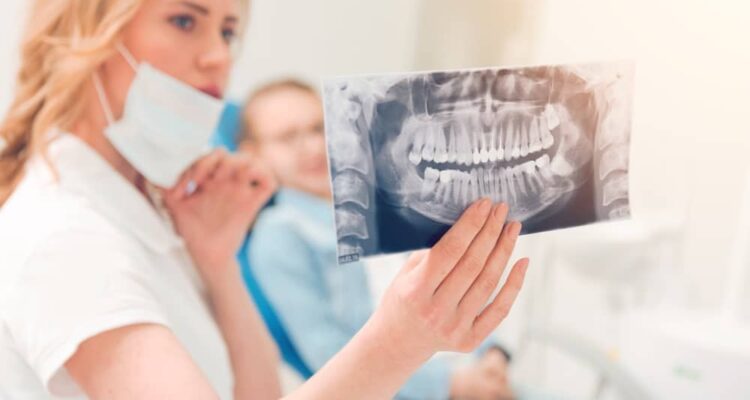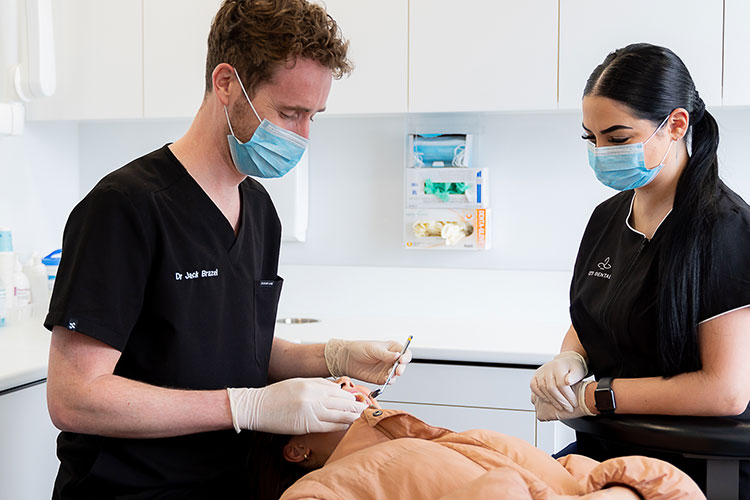“Do I have wisdom teeth?” is one of the most common questions I hear. Although most adults have four wisdom teeth, it is possible to have no wisdom teeth or fewer than four.
In this guide, I’ll cover common questions, misconceptions, and concerns about wisdom teeth, including:
- Does everyone have wisdom teeth?
- How do I know if I have wisdom teeth?
- At what age do wisdom teeth come through?
- Can wisdom teeth come in without causing any problems?
- What are impacted wisdom teeth?
- Why might some X-rays barely show wisdom teeth?
- What are common signs that wisdom teeth are coming in?
- Can wisdom teeth cause pain in other teeth or parts of the mouth?
- What are the signs of wisdom tooth impaction?
- Can wisdom tooth impaction be prevented?
What Are Wisdom Teeth?
Wisdom teeth are molar teeth located all the way at the back of the mouth. Also known as the third set of molars, there are usually two wisdom teeth on the top jaw and two on the bottom.
Does Everyone Have Them?
It is commonly believed that everyone has four wisdom teeth but this is a misconception. Although most individuals have four wisdom teeth, it is also possible to have no wisdom teeth.
Other individuals may only have two wisdom teeth. In rare cases, a person may have more than four wisdom teeth.
The number of wisdom teeth you have isn’t necessarily important. What really matters is how much space your wisdom teeth have and if they erupt in proper alignment.
How Do I Know If I Have Wisdom Teeth?
You may be able to see your wisdom teeth in the very back of your mouth once they come in. Or, your dentist will confirm that your wisdom teeth have erupted.
If your wisdom teeth haven’t emerged yet, your dentist may point them out on an X-ray.
At What Age Do Wisdom Teeth Typically Come Through?
Wisdom teeth are the final set of teeth that form. They usually start forming around age seven or eight but do not emerge until later.
Wisdom teeth typically emerge in the late teens to early adulthood, between the ages of 17 and 25. In some cases, wisdom teeth may not erupt until your late 20s. In other cases, wisdom teeth may remain impacted.
Can They Come in Without Causing Any Problems?
It is a common dental myth that anyone with wisdom teeth will need them removed at some point.
Wisdom teeth problems occur if there is a lack of space to accommodate them or if they erupt in the wrong position.
If your jaw has enough room for wisdom teeth to erupt at the proper angle, you may not need them removed. I am lucky enough to have kept all of my wisdom teeth. They came in at the proper angle and I had adequate space in my mouth for them to erupt without issue.
Although some people can keep their wisdom teeth, most individuals do not have enough space in the jaw to ensure proper alignment and eruption.
If there is insufficient space for wisdom teeth to erupt, problems such as impaction, pain, infection, decay, and swelling can occur.
You May Also Like: The Most Common Dental Myths Debunked
What Are Impacted Wisdom Teeth?
When wisdom teeth do not have enough space to erupt, they may emerge partially or not erupt at all. When all or some of a wisdom tooth is stuck under the gums, this is called wisdom tooth impaction.
Impacted wisdom teeth can lead to a variety of issues and must be addressed as soon as possible by your dentist.
I discuss more about impacted wisdom teeth issues in my video here: Wisdom Teeth Pain and Treatment.
Why Might Some X-Rays Barely Show Wisdom Teeth?
I had an appointment a few weeks ago with a patient who was surprised his wisdom teeth were barely visible on his X-rays.
This can happen due to the stage of development of the wisdom teeth, the type of X-ray used, and the position of the wisdom teeth.
Panoramic X-ray machines that circle the entire head and neck are the best way to clearly see wisdom teeth.
What Are Common Signs That They Are Coming In?
The signs of wisdom teeth coming in vary from person to person. Some people will have no symptoms and not even realise their wisdom teeth are coming in.
Most people will have mild pain that passes quickly once the teeth finish erupting. Other individuals may have severe pain.
Here are possible signs of wisdom teeth coming in:
- Mild, temporary pain
- General jaw discomfort
- Facial swelling
- Infection
- Feelings of crowding in the teeth
What Are the Signs of Impacted Wisdom Teeth?
When teeth come through at the wrong angle or without enough space, it can cause wisdom tooth impaction.
Impacted wisdom teeth can cause a range of symptoms and lead to infection if left untreated.
Contact your dentist right away if you notice signs of impacted wisdom teeth, such as:
- Tender or bleeding gums
- Swollen, red gums
- Significant or reoccurring pain
- A bad taste in your mouth
- Jaw pain
- Difficulty chewing
- Jaw swelling
- Headaches
- Trouble opening your mouth
- Bad breath
- Cysts, tumours, or abscesses
Can Wisdom Teeth Cause Pain in Other Teeth or Parts of the Mouth?
A wisdom tooth without enough space to erupt can push out at the wrong angle. This angle can shift surrounding teeth out of place and cause overcrowding. Over time, this shifting and overcrowding can affect your entire mouth and jaw.
Wisdom tooth impaction also puts surrounding teeth at a higher risk of oral health problems, such as decay and infections.
When a wisdom tooth only partially erupts, it can leave a flap of gum tissue over the tooth. This pocket can trap food debris and bacteria, making it impossible to keep the area clean.
As this pocket continually accumulates debris and bacteria, it greatly increases your risk of decay and gum infection.
Signs of possible gum infection due to wisdom teeth impaction may include:
- Swelling
- Pain
- Bad breath
- Red, inflamed gums near your wisdom teeth
- Fever
- Difficulty swallowing
- Trouble chewing or opening your mouth
- Bad breath
- Sinus pain
- Congestion
- Sore, swollen lymph nodes beneath your jaw
- Pus coming from the gums
If you experience any of these symptoms, it is important to contact your dentist immediately. An appointment is the only way to know if your symptoms are a result of wisdom tooth infection. Your dentist will also determine the most appropriate treatment option.
What Happens If They Are Impacted?
Because of the risks of impacted wisdom teeth, a wisdom tooth extraction is often the safest and most effective treatment.
Your dentist will examine your teeth, use X-rays to confirm the angle and position of your wisdom teeth, identify any abscesses, and determine if removal is needed.
Wisdom tooth extraction is a fairly common surgical procedure and we would be glad to help you determine if you require wisdom tooth removal. Since wisdom teeth are not essential for biting, they can be extracted without issue.
At 123 Dental, we offer in-house wisdom tooth removal and strive to make the experience as pain-free as possible. Wisdom teeth extraction has gotten a bad rap over the years but my patients often tell me that it was surprisingly comfortable.
We offer two types of sedation to ensure you are comfortable throughout the procedure and able to go home the same day.
You can learn more about what to expect with wisdom tooth removal and wisdom tooth removal recovery here: Wisdom Tooth Recovery: Top Tips on How to Help the Healing Process
Can Impaction Be Prevented?
Wisdom tooth impaction cannot be prevented. However, you can reduce the risk of wisdom tooth issues.
Early detection is key, just like with many oral health issues. To prevent wisdom tooth issues, I recommend:
- Seeing your dentist for regular checkups — This allows your dentist to monitor wisdom teeth as they develop and erupt
- Regular dental X-rays to monitor wisdom teeth
- A good oral hygiene routine to prevent decay and infection
- Early removal if wisdom tooth problems start occurring
Learn More: Dental Checkups: 5 Benefits for Regular Checkups
Do You Have Wisdom Tooth Concerns?
Do you have questions or concerns about your wisdom teeth? Are you worried your wisdom teeth may be impacted?
If you are experiencing pain or infection due to impacted teeth or have other oral health concerns, please reach out to our caring team. We will be happy to answer all of your questions or help you book your free consultation to determine if you require wisdom tooth extraction.
Whether you have impacted wisdom teeth, have wisdom teeth that are still developing, or have signs of gum infection, our goal is to restore your oral health as quickly as possible.
Our caring, experienced team will pinpoint the issue, keep you informed throughout the entire process, and ensure we get you feeling better fast. Contact us by emailing our team at info@123dental.com.au, calling us on (08) 9381 3806, or using our convenient online booking tool to schedule your appointment.








